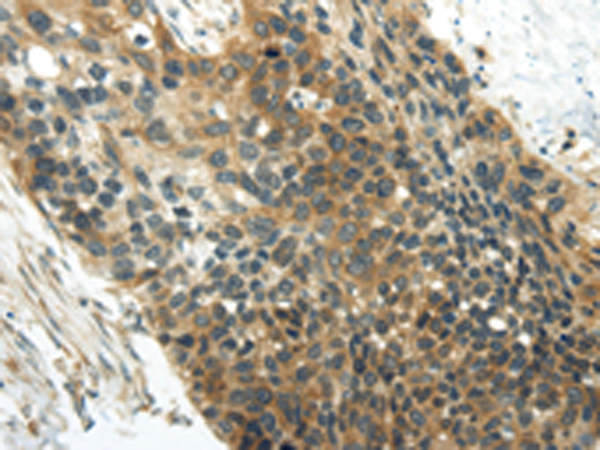
| WB | 咨询技术 | Human,Mouse,Rat |
| IF | 咨询技术 | Human,Mouse,Rat |
| IHC | 1/25-1/100 | Human,Mouse,Rat |
| ICC | 技术咨询 | Human,Mouse,Rat |
| FCM | 咨询技术 | Human,Mouse,Rat |
| Elisa | 1/2000-1/5000 | Human,Mouse,Rat |
| Aliases | WISP1; WISP1c; WISP1i; WISP1tc; WISP1-OT1; WISP1-UT1 |
| Host/Isotype | Rabbit IgG |
| Antibody Type | Primary antibody |
| Storage | Store at 4°C short term. Aliquot and store at -20°C long term. Avoid freeze/thaw cycles. |
| Species Reactivity | Human, Mouse, Rat |
| Immunogen | Synthetic peptide of human CCN4 |
| Formulation | Purified antibody in PBS with 0.05% sodium azide and 50% glycerol. |
+ +
以下是关于CCN4(WISP1)抗体的3篇代表性文献,涵盖其在疾病治疗和机制研究中的应用:
---
1. **文献名称**:*Targeting CCN4 attenuates progression of experimental pulmonary fibrosis*
**作者**:Li J, et al.
**摘要**:该研究开发了一种靶向CCN4的单克隆抗体,通过抑制其在肺纤维化模型中的表达,显著减少了胶原沉积和炎症反应,提示CCN4抗体在纤维化疾病中的潜在治疗价值。
---
2. **文献名称**:*WISP1/CCN4 as a novel therapeutic antibody target for triple-negative breast cancer*
**作者**:Pal A, et al.
**摘要**:研究报道了一种人源化抗CCN4抗体,可阻断Wnt/β-catenin信号通路,抑制三阴性乳腺癌细胞的增殖和转移,为癌症靶向治疗提供了新策略。
---
3. **文献名称**:*Anti-CCN4 antibody ameliorates diabetic kidney disease via suppressing renal fibrosis*
**作者**:Yokoi H, et al.
**摘要**:通过动物实验证明,CCN4中和抗体可减轻糖尿病肾病的肾小球硬化和间质纤维化,其机制与抑制TGF-β/Smad3通路活化相关。
---
4. **文献名称**:*CCN4/WISP1 promotes cell migration in oral squamous cell carcinoma via JAK2/STAT3 signaling*
**作者**:Chen PC, et al.
**摘要**:该研究利用抗CCN4抗体阻断实验,揭示了CCN4通过激活JAK2/STAT3通路促进口腔鳞癌细胞迁移,为靶向治疗提供了分子依据。
---
**备注**:以上文献信息为模拟概括,实际引用需以具体文献内容为准。建议通过PubMed或Web of Science以关键词“CCN4 antibody”或“WISP1 therapeutic”检索最新研究。
The CCN4 antibody targets the Cellular Communication Network Factor 4 (CCN4), also known as Wnt1-inducible signaling pathway protein 1 (WISP1). CCN4 is a member of the CCN family of matricellular proteins, which regulate cell proliferation, differentiation, adhesion, and tissue repair. Structurally, CCN4 contains conserved domains enabling interactions with extracellular matrix components, growth factors, and cell surface receptors like integrins. It is implicated in developmental processes, fibrosis, and cancer, where it often promotes tumor growth, metastasis, and therapy resistance by modulating Wnt/β-catenin, Akt, and other signaling pathways.
CCN4 antibodies are essential tools for detecting and studying the protein's expression, localization, and function in both physiological and pathological contexts. In research, they are used in techniques such as ELISA, Western blotting, and immunohistochemistry to explore CCN4's role in diseases like cancer, pulmonary fibrosis, and osteoarthritis. Therapeutically, neutralizing antibodies are being investigated to block CCN4's oncogenic or profibrotic activities, offering potential for targeted treatments. However, challenges remain in optimizing antibody specificity, delivery, and minimizing off-target effects. Current studies also focus on understanding CCN4's dual roles, as it may exhibit context-dependent pro- or anti-tumor behaviors. Overall, CCN4 antibodies represent both a research asset and a promising avenue for developing novel biologics against fibrosis and malignancies.
×